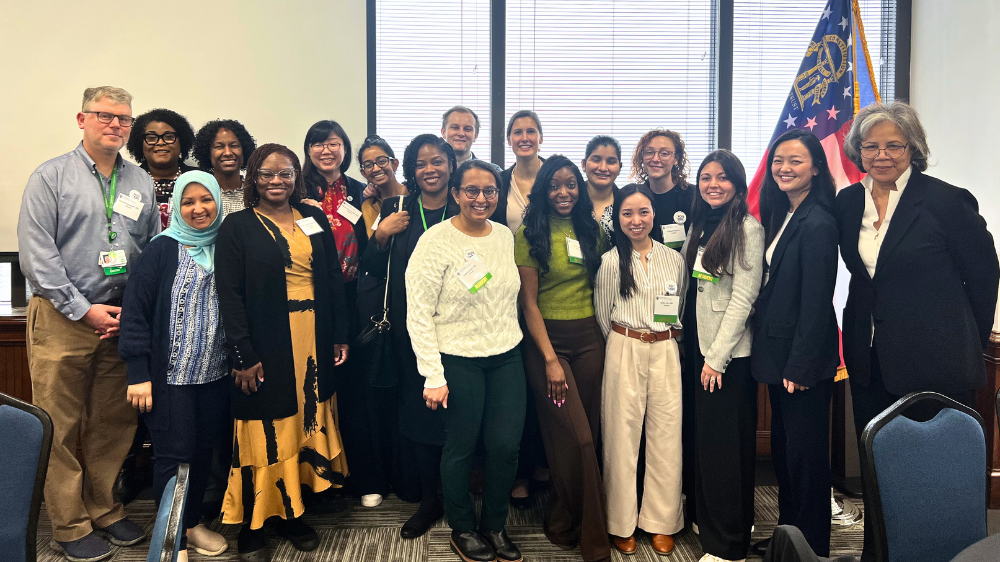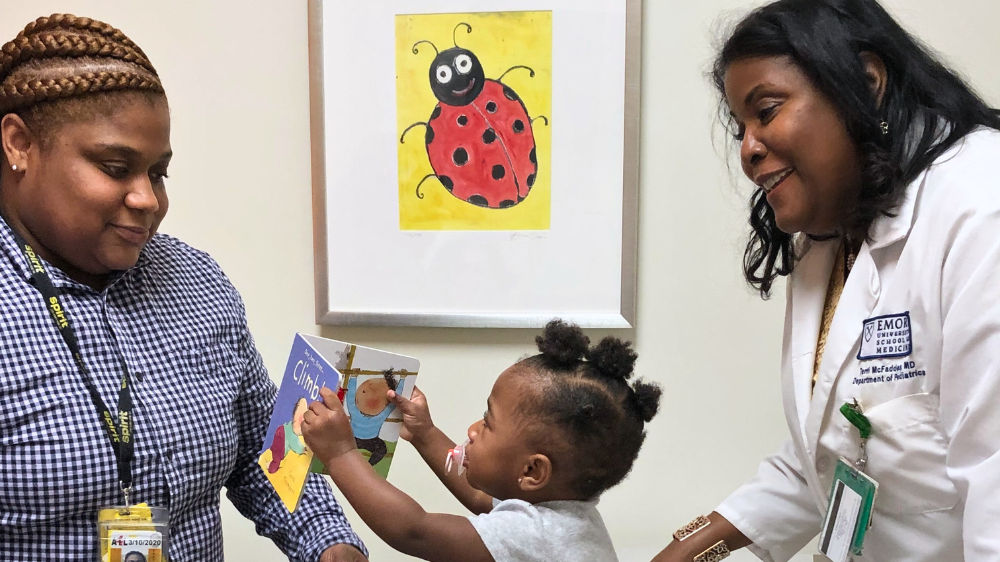Family Centered Model for Primary Care
PARTNERS created a family center model for comprehensive primary care at for the Hughes Spalding Primary Care Clinic at Children’s Healthcare of Atlanta. We have continued to provide comprehensive family support services for the many children who consider our center to be their medical home.
Such support includes a two-generation approach to providing screening and services for children and their families. Faculty, residents, and staff are trained in the rationale and use of screening tools for the patients and their families.
Specifically, PARTNERS support has allowed for the creation and implementation of screening tools for the family, child, and adolescents; support for a behavioral health coordinator; and support for a comprehensive family case management program called PACE, which stands for pediatric access, comprehensive family support, and education.
The process for patient and family behavioral health support includes:
- Screenings for social determinants of health through a family resource survey, which is administered with each well-child visit. This assessment identifies determinants such as housing insecurity, food insecurity, unsafe housing/community conditions, exposure to interpersonal violence, for example. We paired this assessment with an accompanying guide to hospital and community resources to address each problem identified during the screening. We also screen for Adverse Childhood Experiences (ACEs) for both parents and young children. We continue to update both the universal screening process and the approach intervention. Our goal is to address these issues in a manner that best assists families to receive education, counseling, or other services as significant history of exposure to trauma and adversity is identified.
- Developmental screening during well visits for children between six months and five years of age.
- Psychosocial risk-screening questionnaires for children between five and ten years of age and for adolescents, addressing the home, education, eating, activities, drugs, sexuality, suicide/depression (HEADSS) survey for adolescents.
Through these screenings, we have been highly successful in identifying behavioral health needs of our patients and their families. In recent years, Children’s Healthcare of Atlanta has embraced the delivery of integrated behavioral health services based on the model created by PARTNERS some 5 years ago. We are excited to see this level of investment in the mental and behavioral health of our children and families. This level of support allows us to focus on the whole child within the context of their family and community.
Educating the Next Generation of Physicians

PARTNERS is dedicated to providing pediatric residents with holistic training that is socially conscious and produces pediatricians who are dedicated to whole-child care and addressing social determinants of health.
In the last year, we have trained 54 residents to provide family-centered care in the primary care clinic at Hughes Spalding. We have held advocacy-focused training for all 89 of our residents to prepare them to be lifelong pediatrician-advocates for their patients. Our faculty oversees their community rotation, which exposes them to community-based agencies that support child health, including school-based health services, nonprofit organizations, food banks, our health law partnership, and many more. We also meet with residents weekly for structured discussions around topics such as advocacy, social justice, food insecurity, and trauma-informed care.
We have successfully launched a specialized advocacy track (PEACHES) for residents that includes experiential learning sessions and skill-building, structured didactics, and a mentored longitudinal project for each track participant. With mentorship from our faculty, our track residents attend both the AAP’s national advocacy conference as well as the Georgia AAP’s day at the capitol, where they can put their advocacy skills to use.
"Whatever specialty I may choose whatever career path I may follow, I know that everything I have seen and heard and read during this rotation will stick with me. I know that I will do my best to be an advocate for my patients and to work with them one-on-one to meet them where they are really at, to make sure the social determinants of health are in place for them"
Reach Out and Read

Reach Out and Read partners with clinicians and uses the pediatric well-child visit to support parents and caregivers in using shared reading to build early literacy skills and healthy relationships with their young children.
Our practice at Children’s Healthcare of Atlanta at Hughes Spalding was the first program in Georgia to adopt Reach Out and Read in 1996. Since that time, we have given our families age-appropriate and culturally relevant books and discussed the importance of shared reading at each well-child visit.
Over the years, our practice has distributed more than 235,000 books, along with advice for parents about incorporating shared reading into their daily routines.
Because we are an academic practice, in addition to serving as a medical home, we also train pediatric residents and medical students. As a result, our reach has been amplified. All trainees who come through our practice are steeped in the brain science and delivery approaches that are a part of Reach Out and Read. Research shows that the presence of books in the home is a strong predictor of reading achievement, and low-income families have fewer books in their homes compared to wealthier children. Reach Out and Read targets under-resourced communities to reduce this gap.
Eighty percent of a child’s brain develops in the first 1,000 days of life. Reading aloud with children teaches them how to listen, builds early language and literacy skills, and helps them learn about the world. It also teaches them to be curious, empathetic, and patient.
At the well-child visit, we can use a book to evaluate the child and look for developmental milestones. In addition to encouraging parents to read with their children daily, we work with them to be more engaged while reading. Reading aloud helps create and strengthen bonds between the parent and their child. It is proven that healthy relationships are key to social, emotional, and mental development as they get older.
We are also intentional about ensuring that our families and children see themselves and their communities reflected in the books we provide. Our team has been one of the most ardent supporters of Reach Out and Read in our site, community, and beyond. Our team also supports this important initiative more globally as Dr McFadden serves as Medical Director for Reach Out and Read Georgia and sits on the Board of Directors for the national organization.

